Cuba is generally considered a safe country to visit, including for U.S. citizens.
The island is known for its low crime rates compared to many other countries in the region. Violent crime is rare, and the government strongly emphasizes maintaining tourist safety. Most visits to Cuba are trouble-free, and tourists often remark on the warm and welcoming nature of the local population.
However, Cuba shares many safety threats for travelers with other developing countries. These include petty crimes (theft, robbery, scams) and safety risks associated with the country’s crumbling infrastructure (e.g., food poisoning and mosquito-borne diseases).
Cuba is safe to travel to as long as you avoid these safety risks. In this guide, we show you how.
Theft and Robbery
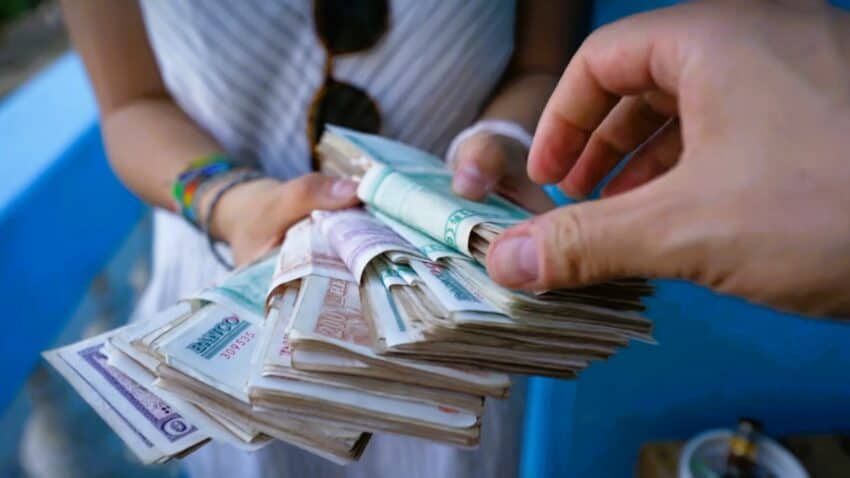
Because of inflation and poor credit card processing infrastructure, tourists need to carry a ton of Cuban Pesos (CUP) to cover most of their trip costs in Cuba.
This will expose them to the most common theft in Cuba: pickpocketing.
Pickpocketing is especially prevalent in crowded places such as public buses, beaches, nightclubs, and tourist areas.
Baggage theft is another common form of petty crime targeting tourists in Cuba. It can happen in hotel rooms, casas particulares (Cuban Airbnbs), cars, and airports.
You might also be a victim of robbery, but incidents of assaults are rare.
While you can’t eliminate the risk of theft and robbery, please take precautions:
- Keep your documentation safe, and always carry copies with you.
- Use a TSA lock on your bag.
- Pack valuables in a carry-on.
- Don’t leave your bags unattended in a car.
- Dress modestly. Don’t show off your jewelry, designer bags, or cash publicly.
- Don’t carry all your cash with you at once, and don’t put your wallet in your back pocket. Protect your cash with a travel money belt or an anti-theft bag.
- Although there are many places to visit in Havana, avoid the poorest neighborhoods.
- Don’t get drunk with strangers or invite them into your room.
- Keep your room’s doors and windows locked.
- If you are driving on Cuban highways, you will notice many hitchhikers. Don’t stop for them.
Shortchanging and Overcharging
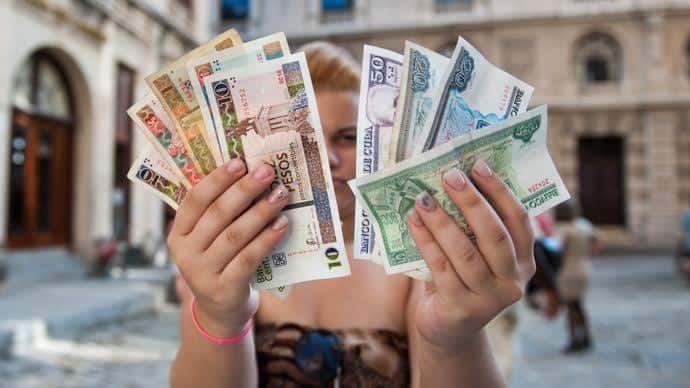
Shortchanging and overcharging are widespread currency scams in Cuba. They can occur at restaurants, street markets, nightclubs, taxis, and when exchanging money on the street.
Follow these tips when using cash to avoid becoming a victim of currency scams:
- Know the Cuban currency. We wrote a whole article about it.
- Check the price before purchasing. Avoid surprises!
- Always pay in Cuban Pesos.
- Double-check your change.
Hustlers
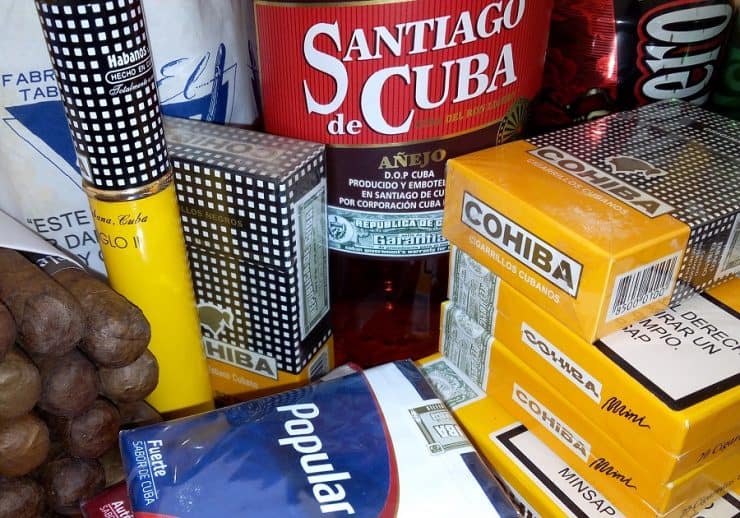
Tourism is a big industry in Cuba. While most Cubans find legitimate ways to profit from tourism, others resort to defrauding travelers.
You may encounter individuals who appear friendly and claim to be tour guides or taxi drivers. Others will offer you cigars (most likely fake) or arrange sex services (chulos).
Some people on the street will offer unsolicited advice, put things on your hands, or even panhandle for money.
Here are things you should do to avoid being scammed by hustlers in Cuba:
- Don’t accept anything someone attempts to push into your hands (unless you want to pay for it).
- Hire official tour companies, such as Tour Republic.
- Don’t buy cigars from street vendors.
- Don’t engage in sexual relations with jineteras (sex workers).
Remember: a polite but firm “no” should be enough to de-escalate any uncomfortable situation.
Sexual Harassment
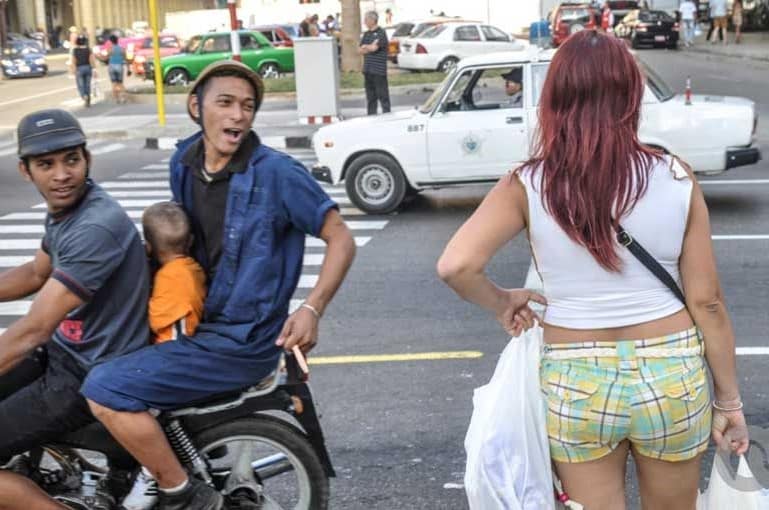
Solo female travelers may experience sexual harassment in the form of catcalling and whistling.
In most cases, these practices are harmless and won’t lead to abuse or violence. In fact, Cubans have a name for it: piropo, which is kind of a compliment to a woman’s physique.
If you feel harassed or constantly bothered by an individual, a firm “No me moleste” (don’t bother me) should be enough to stop him. If not, please call the authorities.
Food Poisoning
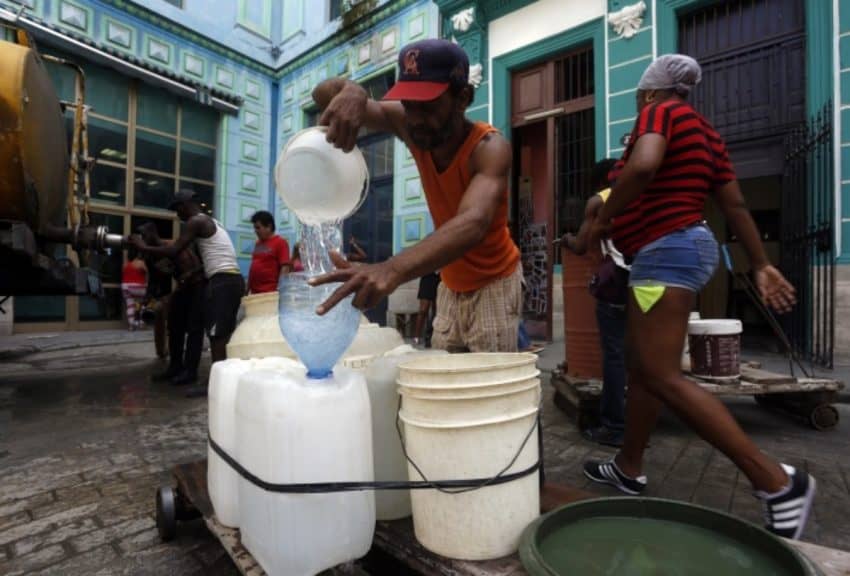
You can get sick with food positioning in Cuba, even at high-end resorts. Street food and tap water are particularly problematic, so avoid them.
If you suddenly experience fever, vomiting, or diarrhea, please find medical help immediately.
However, we are sure you don’t want to deal with this while trying to have fun on the island! Here are some best practices to avoid food poisoning in Cuba:
- Get travel insurance for Cuba. It is an entry requirement -along with the Cuba Tourist Card– and will cover healthcare, which is not free for tourists. We recommend Insuby for Canadians and Americans.
- Stick to bottled water. However, bottled water may not be available everywhere. That’s why you should bring a reusable water bottle, like this one from LifeStraw.
- Don’t buy food from street vendors.
- Eat at reputable restaurants or paladares.
- Bring essential over-the-counter medications.
Mosquito-Borne Diseases
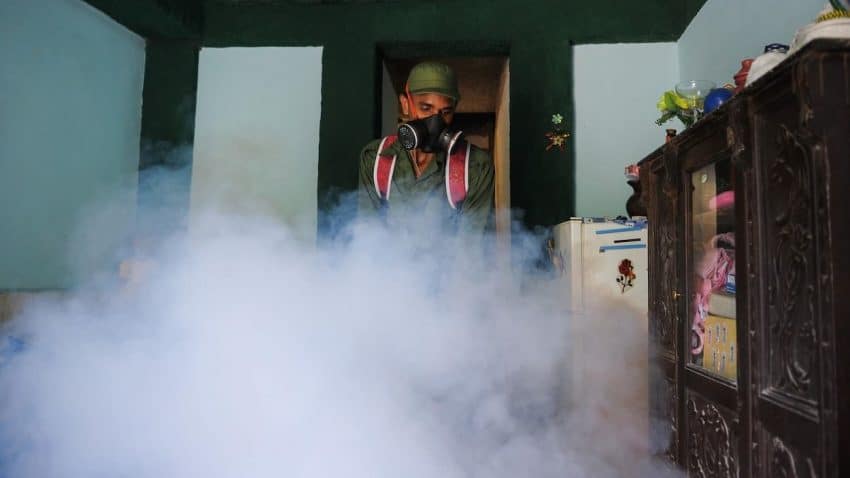
Anywhere you encounter mosquitoes from the Aedes species, you risk contracting the Zika or Dengue virus.
Cuba is no exception. With its tropical climate, mosquito activity is intense, regardless of the season.
Pack a powerful mosquito repellent to protect yourself from mosquito-borne diseases (in addition to lots of itchy bites). It’s an easy way to ensure you stay happy and healthy!
Poor Road Conditions
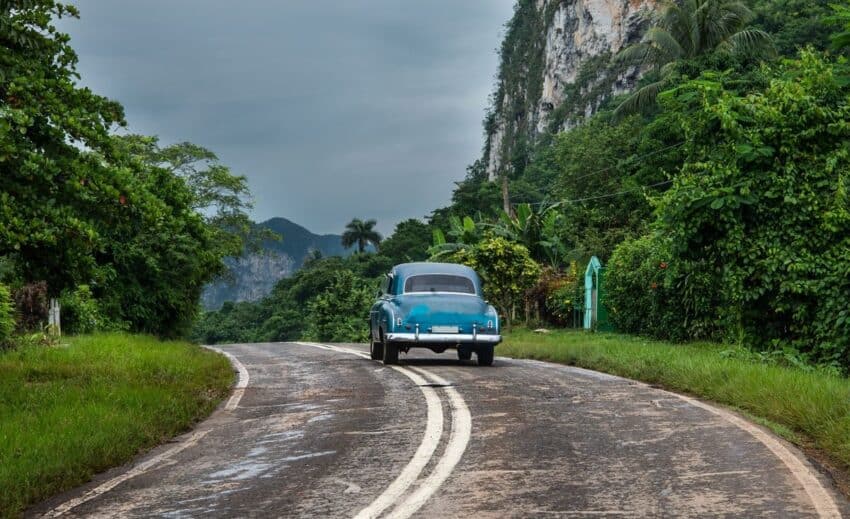
Roads in Cuba have a bad reputation. According to the U.S. Department of State, “accidents involving motor vehicles are the leading cause of accidental deaths in Cuba.”
Lack of regular maintenance, potholes, and inadequate street lighting contribute to hazardous road conditions. Roaming livestock, horse-drawn carts, and pedestrians also use the streets.
If you are driving a rented car in Cuba, be careful, especially at night or during inclement weather when visibility is low.
For short rides, it’s better to hire one of those colorful classic American cars in Cuba.
Internet in Cuba may be hard to get while driving. We suggest bringing a road map like this StreetSmart Map of Cuba.
Natural Disasters
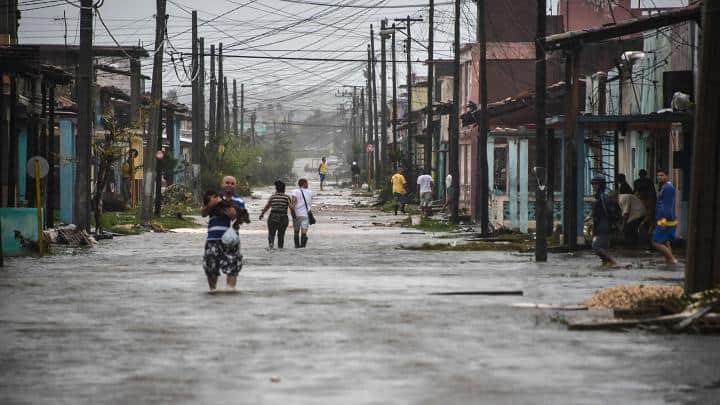
Natural disasters can threaten tourists in Cuba, particularly during hurricane season, which typically runs from August to November.
Cuba is in the Atlantic hurricane basin, making it susceptible to hurricanes and tropical storms. These weather events can bring strong winds, heavy rainfall, storm surges, and flooding.
Tourists might face disrupted travel plans, road closures, flight cancellations, and potential evacuation orders. Additionally, accommodations and infrastructure might suffer damage.
If possible, avoid traveling during the wet season, particularly from September to October.
Cuba is Safe, But Just in Case
Following these basic safety tips, you can have an awesome time in Cuba.
But if you ever run into a safety threat, here are the important numbers and apps to note down:
- Police: 106
- Fire Department: 105
- U.S. Embassy in Cuba: +53 7839-4100
- If you are an American traveling to Cuba, enroll in the Smart Traveler Enrollment Program (STEP).
- For Canadians traveling to Cuba, Canadian Embassy in Cuba: +53 7204-2516
So, do you think traveling to Cuba in 2024 is safe? Let us know in the comments!
Essential Travel Logistics For Cuba
Cuban Tourist Card – If your Cuban Tourist Card (a.k.a Cuban Tourist Visa) isn’t bundled into your airline ticket or travel package, buy it only through EasyTouristCard.
Travel Health Insurance – Travel medical insurance is an entry requirement for Cuba, so you can’t skip it. Travelers can get travel health insurance for Cuba via Insubuy. Travel protection benefits such as trip interruption and cancellation, baggage delay insurance, etc., are not required.
Essential Items to Pack – Bring the essential travel necessities that you may not be able to get in Cuba:
- First aid kit
- Hand sanitizer
- Face masks
- Water bottle with filter
- Sunscreen
- Mosquito repellent
- Pin adapter (for Europeans)
- Travel guide
- Spanish-English phrasebook
- Suggested Reading: The Cubans: Ordinary Lives in Extraordinary Times
Read our complete packing list for Cuba.
Find Accommodations – Find hotels or casas particulares (private accommodations) on Skyscanner, which lists thousands of accommodations available in Cuba.
Book Your Flight – Book cheap flights to Cuba on Skyscanner, our favorite flight search engine to find deals on flights to Cuba.

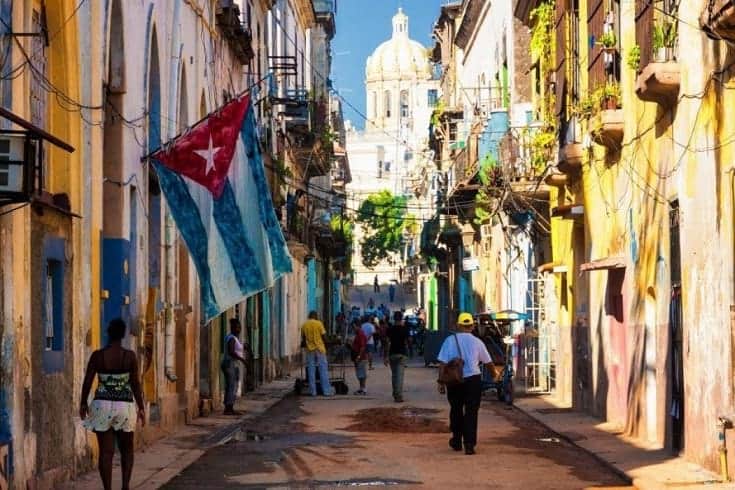

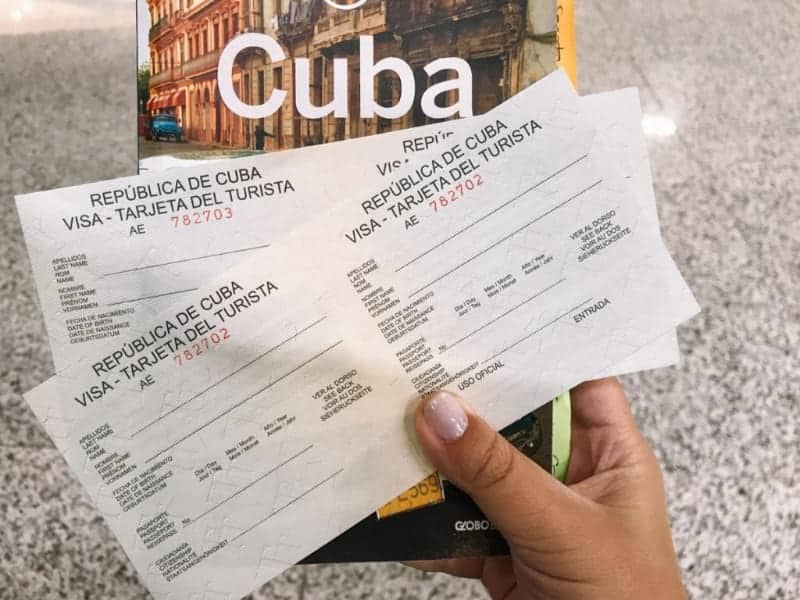
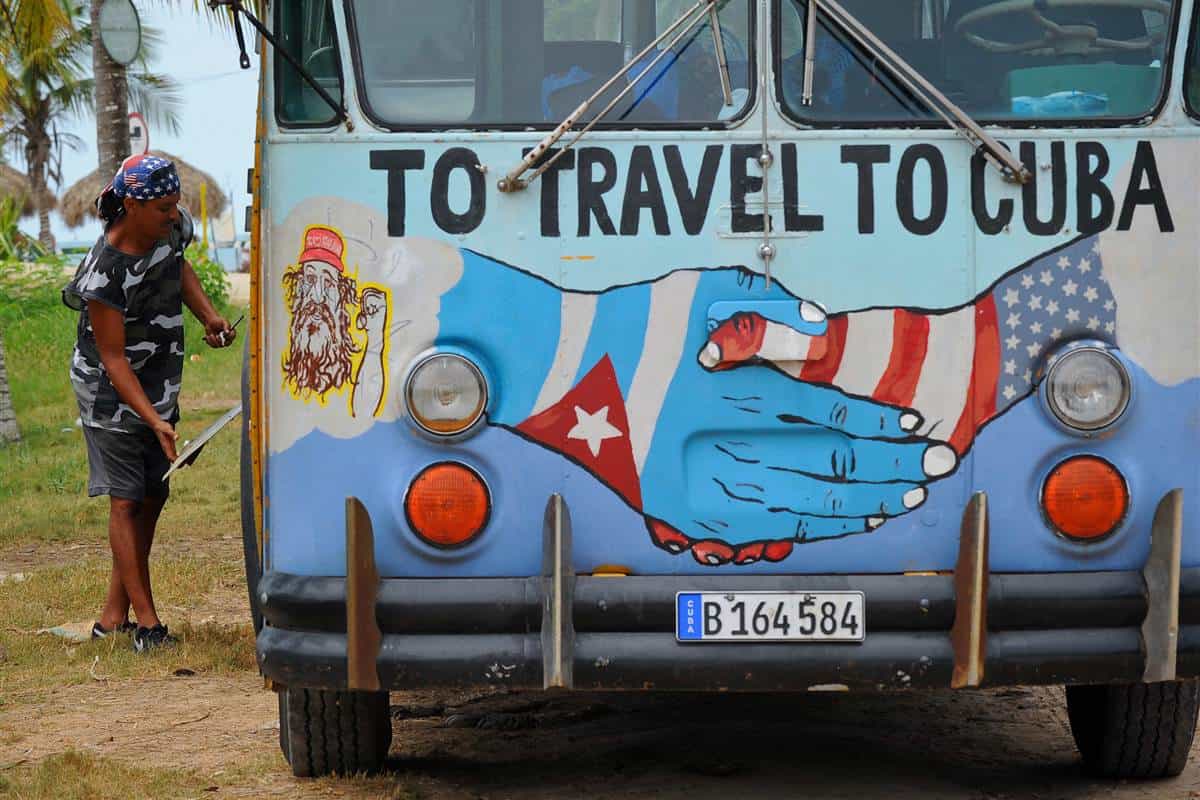
Since 01.01.2021 there is no cuc anymore I’m Cuba just cup. In official change rate is 1$=25 cup at the black market 1$=100 cup
Dec 1/21 Just returned from 2 weeks in Cuba.
Covid vaccination rate for their Cuban produced Soberea vaccine is about 85% for people 2 years + and masks in public places are mandatory. Most Cubans appear to support their country’s vax and max campaign and we neither saw or heard complaints about it. We did hear complaints about how C19 was impacting tourism as it was pretty much shut down until early November. Increased US sanctions also very evident and people complained about things getting even these past two years. As Canadian tourists, we were seen as part of the solution, rather than the problem, and at no time felt unsafe. In particular, it is worth noting that resorts in Cuba are required to follow Covid protocols similar to those in Canada. As in Canada there is variance between resorts, so where ever one goes it is a good idea to get the lay of the land before assuming all is good. We were far more comfortable in the second resort we stayed in than the first, though both were 4 – 5 star facilities. As anywhere, if you are not happy with what you see, it is appropriate to complain to management and/or your travel provider.
Regarding currency scams, the convertible Cuban Paso no longer exists. Apparently the US is imposing a 13% surcharge on USD coming out of Cuba and as a consequence the Cuban government has cut the USD/Paso tie. The official currency remains the Paso and the official exchange rate is about 20 Pasos to a USD. The unofficial street rate is 40 to 50 Pasos per $, maybe higher elsewhere. The problem is that Pasos are almost worthless with purchasing anything but government services and maybe water at a government store.
The current currency moves appear to be to tie the Paso to the Euro, but there are not many Euros floating around and the are few direct flight to Cuba from Europe these days. The USD and Canadian dollar can be used for local most market purchases in most places. If you want to go to a restaurant, either have a non-US credit card or maybe cash in Euros or maybe US or Canadian dollars. You will see prices in USD, but in officially approved restaurants, the only currency/cash accepted will be Euros. Everyone takes tips in whatever currency it is offered with USD/CAD $ being preferred in resorts. With that said, there is a very limited supply of many common commodities in Cuba and as a result what we were told was a very appropriate tip for maids at the end of a stay were things like tooth paste and other consumables. We took first aid kits and some canes which we passed to a trusted local for distribution at the beginning of the trip. We left some clothing and cash for different resort staff when leaving.
Cuba is probably one of the safest places in the world right now from a Covid perspective. They do no get many travelers from anywhere but Canada these days. Both Canada and Cuba have vaccine rates well above 80% and are used to basic Covid safety protocols. Cuba does not have flight connections to Africa (Omnicon variant) and anyone coming into the country is subject to vaccination confirmation and can be quarantined if sick. In the even you do get sick or injured, Cuba has designated clinics and wards for tourists which are better equipped than those available to its citizens. It also has one of the highest ratio of MDs to population in the world. Worried about crime? ….. It has never been a serious issue in Cuba…. Just take normal precautions.
Been to Cuba 5 times, 4 times on my own and I have NEVER had any problems there. I walked around Havana in all hours and felt safer there than I do in London and I live in London. I would say stay in a casa than a hotel, but that is down to you. Also, it is true I only found 1 place that accepted credit cards, so you will need cash, and it can be a pain when all ATMs go down, which happens on occasions. But apart from that, don’t let the media fool you or put you off. Enjoy and have fun. Trinidad and Cienfuegos worth a visit too. Can’t wait to go back when travel restrictions are lifted here in UK. So if you are going..enjoy folks!
Thanks Adam, this was helpful. What I read above really surprised me.
I am also trying to find out how Cuba is doing with Covid infections. Any idea?
Thanks,
Nuvit
Hi Nuvit,
Sadly, Cuba is experiencing an important spike in coronavirus cases for the last three weeks. Hopefully, its vaccine candidates will be successful. Here is some interesting information about it: https://www.cnn.com/2021/03/31/americas/cuba-vaccines-covid-phase-three-intl-latam/index.html
I AM A U. S. CITIZEN AND I AM VISITING CUBA FROM 2-3 YEARS BACK AND FROM MY POINT OF VIEW, CUBA AND LA HAVANA IN GENERAL I NEVER EVER HAD ANY TYPE OF PROBLEMS; EVEN WITH THE NEEDS OF ALL THE CUBANS THEY CARRY ON A DAILY BASIS, CUBANS NEVER EVER WILL HARM ANY PERSON BELONGINGS… I LOVE CUBA MORE EVERY TIME I GO TO SEE MY WOMAN….EVEN WITH ALL RESTRICTIONS THAT COME WITH THE COVID 19 PANDEMIA….
To put this helpful advice into context, Cuba is the least dangerous country on the planet, and Habana has to be the safest of capital cities on the planet. Yes – if you are reckless you can get into trouble, but the consequences will likely be much less than almost any other city which has genuine ‘no go’ areas, organized crime, access to guns and drugs, etc.
Is president Briden going to start letting cubas come into usa???
I been going to cuba holguin for 21 years i live inland i am married to a cuban lady have 2 step daughter…i have never had any problem with anybody…i can walk on the streets day time night time better to have someone with you..in the city been there many time no problem…and with buying anything i rather pay someone on the street they need money badly….in the last couple of year its had for cuban people to find food…my wife has to line up for sometime 10 hour for bread or chicken and shampoo that if they have any left when its her time to buy sometimes she get lucky sometimes nothing terrible
People are starving many people dieing from hungry or they get sick no medince most of the time ….Thing should change for the better no Joe Biden in office
I been going to cuba for 21 years and the poverty is always bad for the people hard for me to get used to it after all these years it’s sad terrible terrible terrible
C’est très juste comme commentaires.
Étant moi-même marié depuis 7 ans à une cubaine, je passe la majorité de mon temps à vivre ici à Cuba. Je suis à la retraite et franchement, sur une échelle de 10, vivre à Cuba vaut un 9 pour la sécurité (comparativement à 5 pour Montréal , Canada) , un 2 pour l’acces au besoin de base si l’on vit ici comparativement à un 9 à Montréal., Les touristes auront accès à des 8 et +).
Il y a 2 types de Cubain, les riches, eux tu ne les rencontreront pas, et le peuple cubain., Et il y a de grande culture et de variétés de gens , car Cuba est un pays axé à l’immigration internationale.
Espagne, francais, russie, italie, canada, et maintenant, un flo incroyable d’immigrant americano – cubano revenant investir dans leur pays. Il n’y a pas de taxes ici.
Les voleurs sont plus des occasions de faire un peu d’argent rapide ..
En 2021, il y a un manque ahurissant de besoin de bases, de nourritures et de médicaments.
Que Dieu nous protèges, embargo, bloqueo, coronavirus..
I have been in Cuba for over a month. It probably is the safest and nicest country in the world. Don’t let the media fool you.
Question?If you got involved in an accident they have 911 or emergency system available?
I went with an inexpensive tour company for 10 days and spent another 3 days on my own in Havana two years ago, and would do it again – although not so sure with current US political situation. The tour was fabulous because they organized transportation, we stayed in casas, and we had some free time, and after the tour I felt comfortable exploring on my own as a single 58 year old, with rusty high school Spanish. The only downside was that the tour had us in casas spread apart, and without cell service, it was difficult to meet up with my other tourmates. So I spent a few evenings dining on my own in new cities, walking around in the dark. It was slightly uncomfortable, but I felt safe enough.
Been to Varadero 7 times and once to Santa Clara. Didn’t like Santa Clara. Will return to Varadero again and again. Love Playa Alameda. Didn’t like Grand Memories. We go for sun, the beaches and the people. Food gets better each time we go but we can always find something to eat. Been on excursions to Havana and Mantanza and on a boat to scuba dive. We love Cuba and have never had any problems with theft or scams or any other crimes.
Hi there any suggestions of where to stay in Varadero please and what was the weather like in May please. Thanks.
It needs to be said that many problems within Cuba can be directly related to challenges for the Cuban people and government from the US embargo of 60 years duration. Not every problem in Latin America is caused by US policy, but if we took responsibility to understand the policies that we are responsible for, we would not only make the lives of Cubans easier, but life as a tourist would be easier as well.
Hi!
I think your blog is very informative, it is a good resource for travelers who want to be safe. Things like how to deal with people there, are very useful. I think that if you now that you are safe, you can enjoy your trip much more.
I think it needs more information about the weather. Cuba is an island in the Caribbean, that means it’s warm, and because the warmth there are mosquitos and you can contact with the Zika virus, that’s very important, but there is another problem; hurricanes! I think that your blog needs more information of how to be prepared in the case that a hurricane hits. I researched a bit and found out that because of the climate change there are even more hurricanes in Cuba. Did you now that the whole population of Havana knows how to be prepared from a very early age, and that every neighborhood in Cuba has an elected official who goes from house to house warning of the danger of the approaching hurricane?
What could I do as a tourist if a hurricane hits?
I’m going to Havana in January and I will try to follow all your safety recommendations to be safe and enjoy the trip!
Hi Isabel, I’m Cuban myself. I landed on this blog looking for something else and scotched reading comments :). Please, font worry about what to do in case of a hurricane. If you are staying in resort, you will be taken care very well and safely. If you are staying in a ” casa particular”, the landlord will know where to send you for you to be in a safe place. I bet you will be put in a place where turists from resorts are sent. Enjoy your travel and always use common sense!
I have been to Cuba 4 times and am going back next week. Beautiful country and lovely people.
I wandered around in downtown Havana in the evening with a friend and felt safer than downtown Ottawa or Toronto. People will approach you with trinkets or food to buy or to play some music, but if you are not interested, say so and they will leave you alone.
The concierge (a Canadian expat) at our hotel told us a few things. First, the government wants tourists (about 90% on the resorts are Canadian). So all of the government sanctioned restaurants and hotels (some are privately owned) are required to use filtered water for ice, food prep, etc. So fresh fruits and vegetables are safe to eat. Eating foods from street vendors could be a problem. I wouldn’t drink the water out of the taps but did brush my teeth with it on the resorts. Never got sick. Second, if a Cuban were convicted of a crime against a tourist it carries a 20 year prison sentence. Could explain the safety aspect.
Of course people will try to make extra money so buyer beware when it comes to street sold goods. All in all, a very safe place to visit and relax. Cubans are passionate about their country and love to share it’s delights.
Thanks for sharing your experience, Yvonne! Definitely very helpful tips!
Where did you stay in Cuba? I’m planning for Dec and you’ve made your experience exactly what we are hoping for.
Yvonne, in addition to my last question, can you share the names of hotels/resorts and area of Cuba? Thanks! 🙂
I went to Havana last year and have never observed or experience any safety issues or problems. I stayed in a casa (superhost airbnb) and intentionally spent & enjoyed days in company of cubain people. Best experience ever!!! While I am vigilant, I believe Cuba is the safest of all of the many islands I have visited. There is much police everywhere to assure order and security. Re: money.. exchanged money to cuc at exchange bureau or bank (Canadian based credit card) as I needed. Strongly suggest, you find out what time bank opens and be in line 30 minutes before opening. Only 2 or 3 people allowed in bank at one time. I also discovered that some high end hotels can accomodate guest for a credit card withdrawal but to a maximum amount.
Thanks for the great tips, Jap! We are thrilled that you had such a great time in Cuba 🙂
what if you have an American based debit or credit card? Do have to get all of the cash you need before flying in to Cuba? What about a traveler’s card? I am thinking about going here for a medical mission. Thanks so much!!!
Hi Graver,
Unfortunately, if your credit/debit card was issued by an American card, it won’t work in Cuba :(. For more tips on how to deal with money in Cuba, please check out our Cuban currency article. Hope it helps!
We are travelling from havana to trinidad then onto matanzas over a period of 10 days. i was told i would have to take spend money as cash and exchange it for CUC when i get there. but its not safe carry all your money around with you as cash, so is there a way of using my santander bank (or any other bank) to withdraw money in a bank in cuba as and when i need it
Hi Jimmy,
If your credit card is not issued by a US bank, you shouldn’t have problems getting cash in Cuba. However, keep in mind that the country’s outdated technology makes it difficult to use credit cards in shops, restaurants, etc.
Very safe, thank you